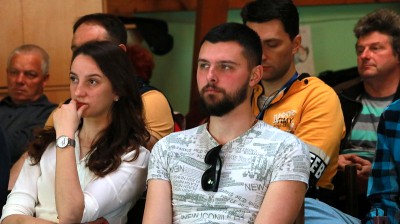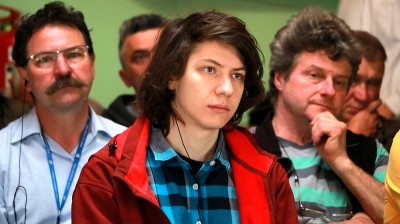The EoC weekend that brought together about 60 entrepreneurs from Central and Eastern Europe took place in Totovo Selo, a small rural village in Vojvodina near the border with Hungary.
From 26 to 28 April 2024, around 60 entrepreneurs, students and people who live the culture of giving in their business environment gathered in Serbia. Apart from those of the host country, participants came from Romania, Hungary, Croatia, Slovakia, Russia, Spain and Italy, the latter two countries represented by two members of the EoC’s International Commission. The meeting took place in Totovo Selo, a small village on the border with Hungary nestled in the countryside, surrounded by the waves of growing wheat on one side and oil pumps on the other.
The chosen setting, far from the consumerist comforts of a larger city or the capital city, Belgrade, reflects one of the objectives chosen by the local EoC Commission: to be in the environment in which many of the entrepreneurs in Serbia live, in contact with the reality they face every day in their economic choices. But above all, to be there where those who in a different but equally authentic way are part of the EoC also live: people in a state of vulnerability, those who by receiving help/support from EoC businesses complete its vocation: to give-and-receive so that there is no one deprived. And the visit to 4 concrete instances of EoC implementation in the region (a farm, a ceramics atelier, the studio of a lawyer, the renovated house of a destitute family) gave everyone a lasting impression of the dimension and depth of the EoC commitment in Serbia. 
The programme also had other objectives and themes: starting from the Social Doctrine of the Church, Dr Karolj Orčik emphasised the ‘Christian-entrepreneur’ binomial: the recognition of challenges and opportunities, as well as teamwork. He then invited entrepreneurs to follow the apostles’ example and ‘leave behind’ their investments and start new investments and activities according to five fundamental principles: human dignity, solidarity, subsidiarity, common good, justice.
Dmagoj Sajter, professor at the Faculty of Economics in Osijek, presented the relationship between the Social Sciences of the Church and the Economy of Communion. He highlighted the value of the “relational good” as a connection and expression of the broader concept of the EoC:
‘In an era when we are forced to think about what I can offer the world, and what artificial intelligence cannot, one answer can be: a network of real relationships. Making oneself irreplaceable means building positive, quality relationships with colleagues, customers and all stakeholders so that one's connection becomes fundamental to the success of the team and the organisation’.
The round table discussion that followed presented an array of credible testimonies of how relationships that are desired, built, suffered and nurtured by the love of God in the person truly prove to be a key economic breakthrough affecting profit, the seriousness of a business and the trust of partners, suppliers and buyers. 
There was no shortage of space for the contribution of young people like Dejan Uršićić, who shared his repeated attempts to start a small business without losing heart in failure, as he recounted: ‘It was during that time that I returned to God and, looking at life around me, I began to see Him. And a quote from the book of Genesis came to mind: »And God separated the light from the darkness, and God saw that the light was good.« And so I asked myself, »How can I now separate the light from the darkness?«’
And then Pavlina Sepinski, a young entrepreneur with an artistic talent that expresses itself in “applied art in cosmetics” as she puts it, told of her recently opened beauty salon: ‘I consider my business, work, salon and everything I create with it as a huge blessing that God has given me. Now I am looking ahead and still learning new methods because I want to expand my services and have as much knowledge as possible so that one day I can hire someone and offer my clients the best possible treatments'. 
Undoubtedly, a lot of input was given over the two days. The time spent together also allowed for personal introspection as to how everyone understands the words economy and communion, what added value each participant brings to the workplace, what relational assets they invest in... and certainly many other questions that we feel, seeing the lively communication taking place during the breaks, found answers and encouragement, precisely in the relationship experienced by everyone with each other in Totovo Selo.
See all the highlights in the Photogallery








